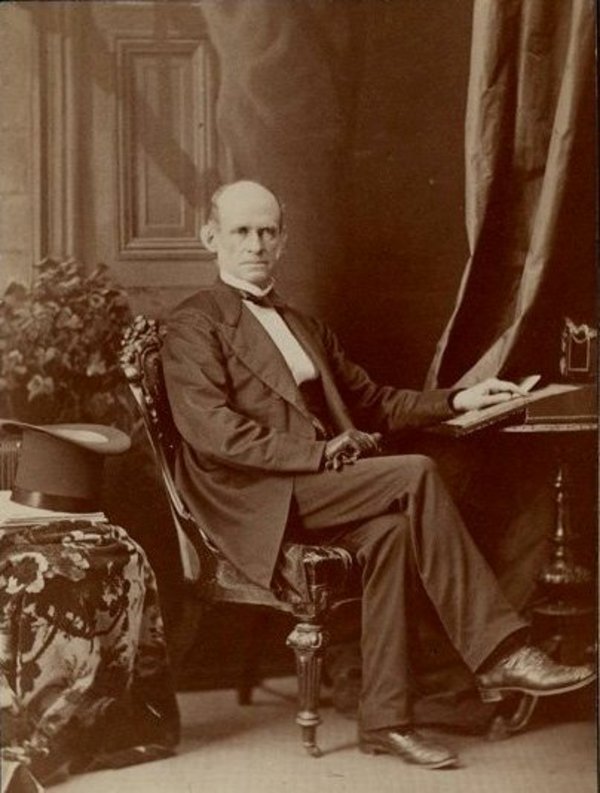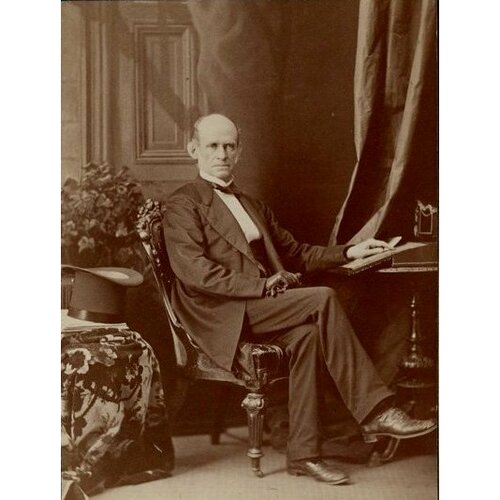
Source: Courtesy of Wikimedia Commons
STUART, GEORGE OKILL (O’Kill), lawyer, politician, and judge; b. 12 Oct. 1807 at York (Toronto), Upper Canada, son of George Okill Stuart*, a Church of England priest, and Lucy Brooks; m. in 1833 Margaret Black Stacey (there were no children); d. 5 March 1884 at Quebec City.
George Okill Stuart, born into an influential and respected family, was educated in Kingston, Upper Canada, and in Quebec before beginning the study of law in the Quebec office of his uncle, James Stuart*, attorney general of Lower Canada. He was called to the bar in 1830 and four years later joined his uncle in a partnership, which was dissolved in 1838 when the latter was named chief justice of Lower Canada. George Okill Stuart was also active in municipal affairs. From 1841 to 1843 he served as a solicitor for the city of Quebec. He was elected councillor for Saint-Louis Ward in December 1843 and during the following year sat on the committees for public health, finance, and elections. Stuart enjoyed continued success in municipal elections and on 9 Feb. 1846 the city council unanimously elected him the first English-speaking mayor of Quebec, to succeed René-Édouard Caron*. Stuart held the position for the next four years, during which time the city made improvements in street lighting and began the construction of a water supply and sewage system.
Stuart was viewed throughout his political career as a person with support from both English- and French-speaking groups. Stating that he would follow a “steady, independent and impartial course,” he secured one of the two Quebec City seats when he ran for the provincial assembly in 1851 as an independent Conservative. In July 1854, however, he suffered overwhelming defeat in the constituency, now a three-member riding, at the hands of Charles Joseph Alleyn, Jean Blanchet*, and Jean Chabot*. Talk of “roguery and perjury” during this election was so pervasive that Stuart contested the results, without success. After Blanchet resigned in March 1857 because of ill health Stuart was prevailed upon to accept nomination. He won the by-election of 14 April but retired from politics the following November when the session ended.
Stuart returned to his legal practice. He had served as bâtonnier (president) of the bar of Lower Canada for the district of Quebec from 1 May 1851 to 1 May 1853 and was instrumental in obtaining increased salaries for assistant judges. Named qc in 1854, he received a temporary appointment in September 1855 as assistant judge of the Superior Court of Lower Canada, under the provisions of the Seigniorial Act of 1854. By 1861 he was practising law in partnership with John Murphy, the firm of Stuart and Murphy lasting at least 11 years.
In April 1873 Henry Black*, a judge of the Vice-Admiralty Court and an uncle of Stuart’s wife, sought and obtained Stuart’s services as an assistant. Four months later Black died. Stuart, who was nominated to replace him on 27 October, took the oath of office on 2 Jan. 1874. Stuart had been particularly interested in admiralty law and his legal practice had possessed a sizeable maritime clientele. In addition, he had compiled a volume of case reports of the courts of King’s Bench, Appeals, and Vice-Admiralty in 1834, and edited a work dealing with cases of maritime law on the St Lawrence in 1858 (a second volume was published in 1875). A decision by Stuart in 1880 concerning the brigantine Atalaya, detained for contravention of the imperial Foreign Enlistment Act of 1870, attracted much attention. He ruled that because the charges were unsubstantiated, the vessel was to be released and its owners recompensed for the costs and damages of detention. Judges of the Vice-Admiralty Court were appointed by Great Britain and there is evidence that during his later years Stuart questioned the dominion and imperial governments’ responsibilities for the court. In 1891 the court was abolished and its functions were assumed by the Exchequer Court of Canada.
Stuart and his wife were leading members of Quebec society. He was also active in several Quebec businesses, including the Canada Fire Assurance Company and the Quebec Bank, and served on the board of directors of the St Maurice Railway and Navigation Company in 1857. In 1863 he was a lay delegate to the Quebec diocesan synod of the Church of England and from 1873 to 1875 he was honorary counsel for the Church Society. When he died the Morning Chronicle observed that Stuart’s memory would be cherished by those who knew “what simple tastes and what a warm, affectionate and generous nature were partly concealed under a somewhat formal and reserved manner.”
George Okill Stuart compiled Reports of cases argued and determined in the courts of King’s Bench and in the provincial Court of Appeals of Lower Canada, with a few of the more important cases in the Court of Vice Admiralty . . . (Quebec, 1834) and edited Cases selected from those heard and determined in the Vice-Admiralty Court at Quebec . . . (2v., London, 1858–75).
AO, MU 2923. PAC, MG 27, 1, 127; RG 1, E1, 98; RG 4, C1, 295, file 880; 383, file 3204; RG 13, A1, 447, files 630, 1459. Canada Gazette, 18 Dec. 1854. Cases selected from those heard and determined in the Vice-Admiralty Court at Quebec . . . , ed. William Cook (Montreal, 1885), 215–39. Quebec Gazette, 27 July 1854. Quebec Morning Chronicle, 11 Feb. 1846; 14 Oct., 5, 17 Nov., 16 Dec. 1851; 5 July 1854; 18 July 1872; 24 July 1880; 5 March 1884; 4 July 1893. Canadian biog. dict., II. Dominion annual register, 1884: 246–47. Quebec directory, 1844–81. P-G. Roy, Les juges de la prov. de Québec. F-X. Chouinard et Antonio Drolet, La ville de Québec, histoire municipale (3v., Québec, 1963–67), III.
Cite This Article
Kenneth S. Mackenzie, “STUART, GEORGE OKILL (O’Kill) (1807-84),” in Dictionary of Canadian Biography, vol. 11, University of Toronto/Université Laval, 2003–, accessed January 1, 2026, https://www.biographi.ca/en/bio/stuart_george_okill_1807_84_11E.html.
The citation above shows the format for footnotes and endnotes according to the Chicago manual of style (16th edition). Information to be used in other citation formats:
| Permalink: | https://www.biographi.ca/en/bio/stuart_george_okill_1807_84_11E.html |
| Author of Article: | Kenneth S. Mackenzie |
| Title of Article: | STUART, GEORGE OKILL (O’Kill) (1807-84) |
| Publication Name: | Dictionary of Canadian Biography, vol. 11 |
| Publisher: | University of Toronto/Université Laval |
| Year of publication: | 1982 |
| Year of revision: | 1982 |
| Access Date: | January 1, 2026 |



